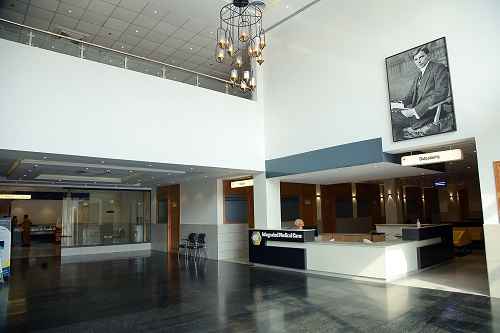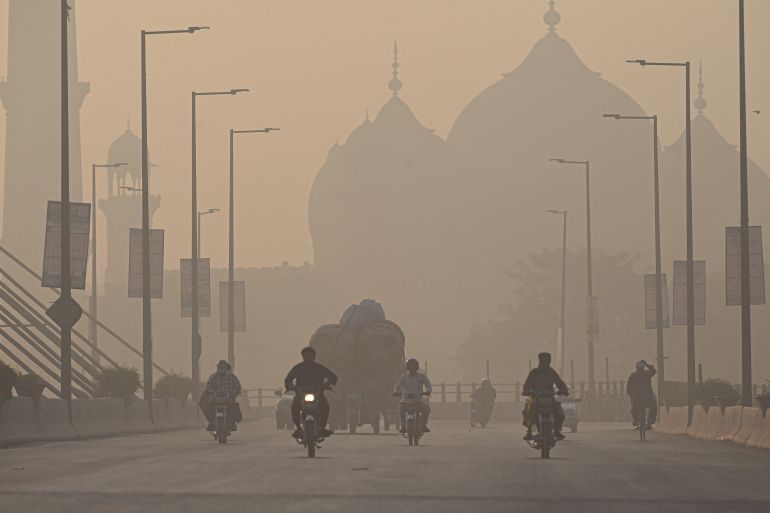- 27-Nov-23
Smog in Lahore is a persistent environmental issue that primarily occurs during the winter months. The term "smog" is a combination of smoke and fog, and in the context of Lahore, it refers to a thick layer of air pollution that often engulfs the city. The main contributors to smog in Lahore include vehicular emissions, industrial pollutants, agricultural burning, and atmospheric conditions that trap pollutants close to the ground.
During the winter, the temperature inversion phenomenon occurs, trapping pollutants and preventing them from dispersing into the atmosphere. This leads to the formation of a dense layer of smog, reducing visibility and causing various health issues. The smog not only affects the residents of Lahore but also poses a significant challenge for the local authorities in terms of air quality management.
Air Quality Index Lahore:
Sensitive groups will have immediate health impacts and should refrain from outdoor activities. Healthy people may have trouble breathing and feel irritated in their throats; if this is the case, stay inside and postpone outdoor activities.To address the issue of smog, measures such as strict emission standards, promotion of public transportation, and efforts to reduce crop residue burning in the surrounding agricultural areas are crucial. Additionally, public awareness campaigns about the health risks associated with smog exposure and the importance of individual contributions to air quality improvement can play a role in mitigating this environmental concern.
How Smog is Affecting Human Health in Lahore?
Smog in Lahore has significant adverse effects on human health due to the high levels of air pollution. The primary components of smog, including particulate matter (PM2.5 and PM10), nitrogen dioxide (NO2), sulfur dioxide (SO2), carbon monoxide (CO), and ozone (O3), can have various health impacts when inhaled. Here are some ways in which smog affects human health in Lahore:
- Respiratory Issues: The fine particulate matter in smog can penetrate deep into the lungs, causing respiratory problems. This can lead to conditions such as asthma, bronchitis, and exacerbation of existing respiratory diseases.
- Cardiovascular Problems: Prolonged exposure to air pollution, including the pollutants present in smog, is associated with an increased risk of cardiovascular diseases. It can contribute to heart attacks, strokes, and other cardiovascular issues.
- Irritation of Eyes and Throat: Smog can cause irritation of the eyes and throat, leading to discomfort and a higher susceptibility to respiratory infections.
- Aggravation of Pre-existing Conditions: Individuals with pre-existing health conditions, such as respiratory or cardiovascular diseases, are more vulnerable to the adverse effects of smog. Exposure to smog can exacerbate their existing health issues.
- Reduced Lung Function: Long-term exposure to air pollution, including smog, has been linked to a decline in lung function over time. This can affect the respiratory capacity and overall well-being of individuals.
- Increased Mortality Risk: Studies have shown that high levels of air pollution, as seen during episodes of severe smog, are associated with an increased risk of premature mortality. This risk is particularly elevated among individuals with compromised health.
- Adverse Effects on Children: Children are particularly vulnerable to the health effects of smog due to their developing respiratory systems. Exposure to smog can lead to long-term respiratory problems and developmental issues.
To mitigate the health impacts of smog, it is essential for residents of Lahore to stay informed about air quality levels, take necessary precautions during periods of high pollution, and support measures aimed at reducing air pollution in the region. This includes advocating for cleaner transportation, stricter industrial emission controls, and efforts to minimize agricultural practices that contribute to smog formation.
Integrated Medical Care Hospital (IMC Hospital):
The multi-specialty IMC Hospital was established as a joint venture with DHA Lahore with the intention of revolutionizing healthcare and introducing the concept of completely integrated treatment and services. By combining methods and practices for patient management and putting people before illness, IMC overcomes the inherent difficulties of inpatient care. IMC provides a digital platform that integrates many healthcare service components to transform the way healthcare services are provided. Visit the Integrated Medical Care Hospital (IMC Hospital) and schedule a consultation.

 Map
Map










